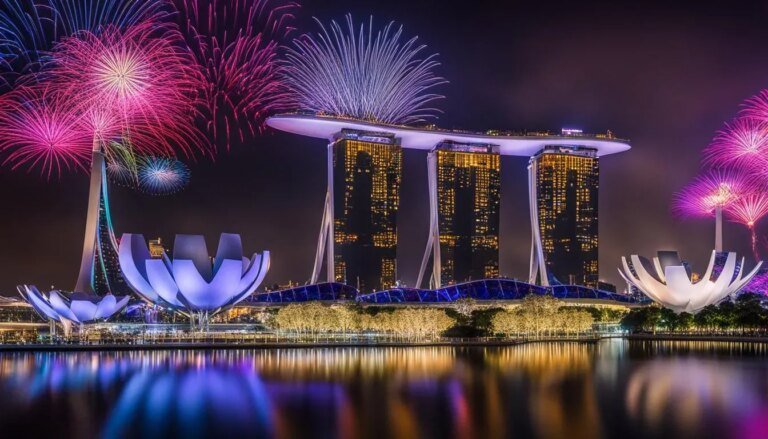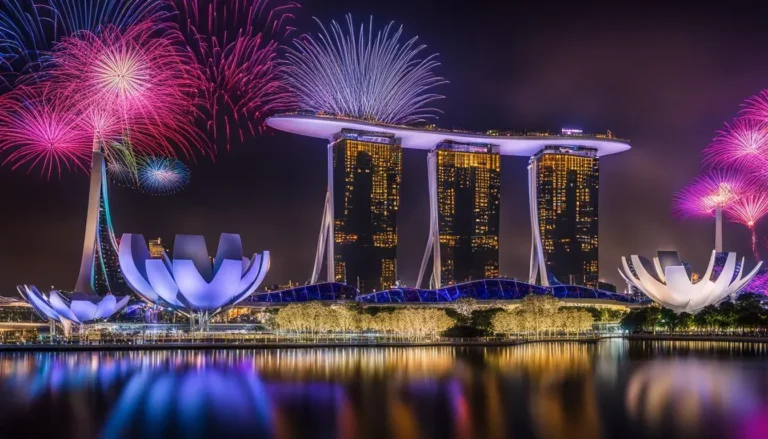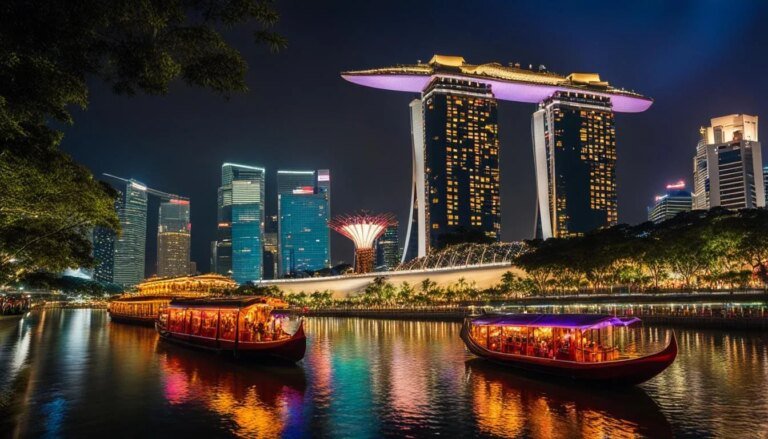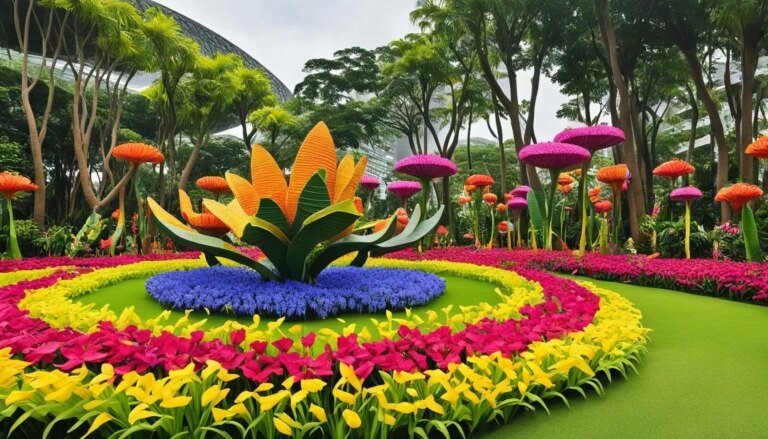Dragon Boat Festival China 2024: Names, Origins, Traditions, Greetings
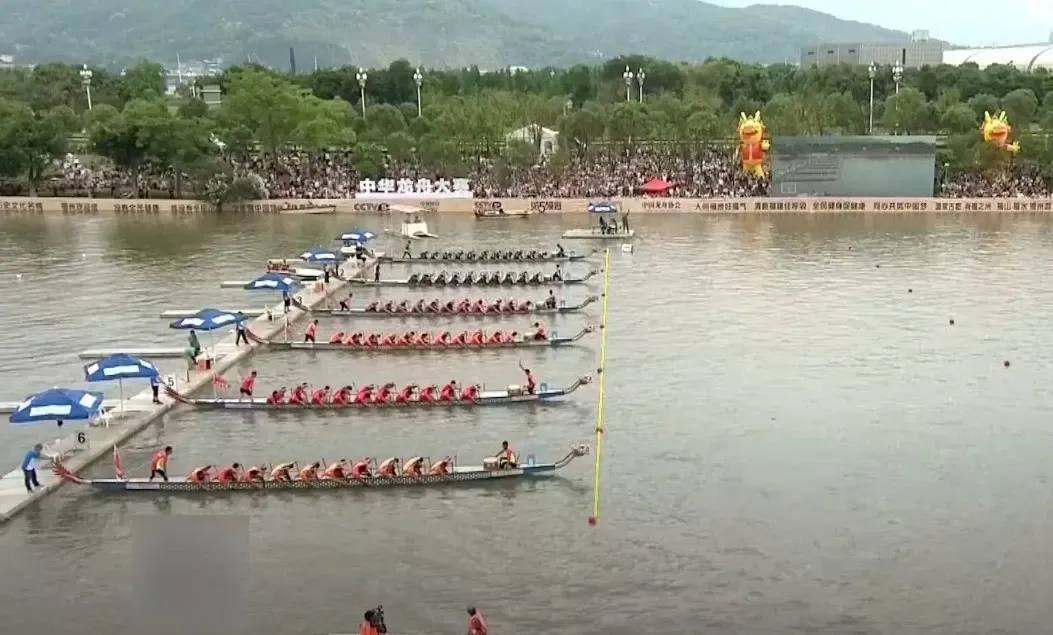
In 2024, this vibrant and culturally significant holiday will take place on June 10. Known as one of the four top traditional Chinese festivals, the Dragon Boat Festival holds deep historical and cultural significance that extends beyond China’s borders. Let’s explore the names, origins, traditions, and greetings associated with this auspicious event.
Key Takeaways:
- The Dragon Boat Festival in China is a traditional holiday celebrated on the fifth day of the fifth lunar month, which falls in late May or June on the Gregorian calendar.
- The festival has deep cultural and historical significance and is one of the four major traditional Chinese festivals.
- Dragon Boat Festival customs include dragon boat racing, consuming sticky rice dumplings, and engaging in practices to ward off evil spirits and promote good health.
- The festival’s origins can be traced back to both the commemoration of the death of Qu Yuan and the desire to protect against diseases during the “month of poison.”
- The Dragon Boat Festival is known by various names, such as Duanwu Jie, Tuen Ng, Dumpling Festival, and Double Fifth Festival.
Facts About The Dragon Boat Festival
| Facts | Explanation |
|---|---|
| Name of Festival: | Dragon Boat Festival |
| Type of Festival: | Traditional Chinese Festival |
| City of Origin: | Wuhan, China |
| Festival Etymology: | The festival is named after the dragon boat races that are a central part of the celebration. It is also known as the Duanwu Festival, derived from the Chinese words “duan” meaning “beginning” and “wu” referring to the fifth day of the fifth month in the lunar calendar when the festival takes place. |
| First Celebration Date: | Unknown (over 2,000 years ago) |
| Founder of the Festival: | Qu Yuan was a famous poet and statesman during the Warring States period in ancient China. |
| Brief History of the Festival: | The Dragon Boat Festival has a rich history dating back over 2,000 years. It originated from the legend of Qu Yuan, who was a loyal minister and poet. When his kingdom fell into turmoil, he drowned himself in the Miluo River out of despair. The local people, who admired him greatly, raced their boats to save him but were unsuccessful. To commemorate Qu Yuan’s sacrifice, the Dragon Boat Festival is celebrated by racing dragon boats and eating sticky rice dumplings called zongzi. The festival is also associated with warding off evil spirits and disease. It has become a time for family gatherings and cultural festivities. |
| Brief History of the City: | Wuhan is the capital city of Hubei Province in central China. With a history of over 3,500 years, it has been an important cultural, economic, and transportation hub in the region. Wuhan is known for its strategic location at the confluence of the Yangtze and Han rivers. The city has witnessed significant historical events and played a crucial role in China’s revolution and modernization efforts. Today, it is a vibrant metropolis with a blend of modern architecture and historical landmarks. |
| Ethnic Information: | Han Chinese (predominant) with various ethnic minorities |
| Location in Country: | Central China, Hubei Province |
| How to Reach the City: | By air: Wuhan Tianhe International Airport (WUH) is the main airport serving the city. By train: Wuhan Railway Station and Wuhan East Railway Station are major railway hubs connecting Wuhan with other cities in China. By road: Wuhan has an extensive network of highways and expressways linking it to neighbouring cities and provinces. |
| Nearby Cities or Towns: | – Huangshi (76 km) – Jingzhou (78 km) – Yichang (299 km) – Xianning (118 km) – Xiantao (62 km) |
| Google Map Link: | Wuhan City Location |
| Festival Main Events and Activities: | – Dragon boat races on rivers and lakes – Eating zongzi (sticky rice dumplings) – Hanging up pouches of herbal medicines called “Xiong huang” to ward off evil spirits – Wearing colourful silk threads to protect against evil spirits – Making and wearing medicinal sachets called “xiang bao” for good health – Displaying portraits of Qu Yuan and reciting his poetry – Enjoying traditional music, dance performances, and other cultural activities – Visiting temples and praying for blessings |
| Landmarks in the City: | – Yellow Crane Tower: Famous for its cultural significance and stunning views – Wuhan Yangtze River Bridge: An iconic bridge spanning the Yangtze River – East Lake Cherry Blossom Park: Known for its picturesque cherry blossoms in spring – Guiyuan Buddhist Temple: A historic temple with beautiful gardens and intricate architecture – Wuhan University: One of China’s oldest and most prestigious universities – Jianghan Road Pedestrian Street: A vibrant street showcasing Wuhan’s commercial and cultural scene |
| Related Festivals in the Region: | – Mid-Autumn Festival (Zhongqiu Festival): Celebrated on the 15th day of the eighth lunar month, known for mooncakes and family reunions – Spring Festival (Chinese New Year): Celebrated on the first day of the lunar calendar, marking the start of a new year with festive traditions and customs – Lantern Festival (Yuanxiao Festival): Celebrated on the 15th day of the first lunar month, featuring lantern displays and riddle-solving activities – Qingming Festival (Tomb-Sweeping Day): Observed to honour ancestors by visiting their graves and enjoying outdoor activities |
Why “Dragon Boat Festival” is celebrated
The Dragon Boat Festival is celebrated to commemorate the death of the poet and minister Qu Yuan during the Warring States period of the Zhou dynasty. It is also associated with the stories of Wu Zixu and Cao E and is believed to have originated as a celebration of agriculture, fertility, and rice growing in southern China.
The festival involves various rituals and activities such as dragon boat racing, consuming zongzi (sticky rice dumplings), and drinking realgar wine.
Importance of Dragon Boat Festival
The Dragon Boat Festival holds immense significance in Chinese culture. While many associate it with commemorating the death of Qu Yuan, there is evidence suggesting that the festival originated as a traditional medical and health event during a time when diseases were rampant. It was believed to serve as a form of protection against illnesses and evil spirits.
Today, the festival not only honours Qu Yuan’s patriotism and contributions to classical poetry but also promotes good health and guards against diseases.
The origins of the Dragon Boat Festival as a health festival highlight its historical importance within Chinese society. During ancient times, when diseases posed a significant threat, the festival served as a preventive measure. Celebrants would engage in various customs and activities to ward off illnesses and protect themselves from evil spirits.
While the historical significance of the festival remains intact, it has evolved to become a celebration of culture, tradition, and national identity. The Dragon Boat Festival has become an occasion for people to come together, strengthen community bonds, and honour their heritage.
“The Dragon Boat Festival is not just about remembering the past, but also about preserving the essence of Chinese culture and passing it on to future generations.”
Today, the Dragon Boat Festival is a time for families and friends to gather, participate in dragon boat races, and partake in various customs and traditions. It serves as a reminder of the rich history and cultural diversity of China, creating a sense of unity and pride among the people.
| Historical Significance | To honour Qu Yuan and his contributions to classical poetry |
|---|---|
| To promote good health and protection against diseases | |
| Evolving Tradition | Preserving Chinese culture and passing it on to future generations |
| Strengthening community bonds and fostering a sense of unity |
Dragon Boat Festival Customs
The Dragon Boat Festival customs encompass a rich tapestry of traditions that celebrate the festival’s cultural and historical significance. These customs can be broadly categorized into two main categories: those that honor the dragon and heroes like Qu Yuan, and those that focus on warding off evils and promoting good health.
Dragon Boat Racing and Sticky Rice Dumplings
A prominent custom during the Dragon Boat Festival is dragon boat racing, where teams paddle in long, narrow boats adorned with dragon-shaped heads and tails. This exhilarating activity not only showcases teamwork and physical prowess but also pays tribute to the dragon, a symbol of strength and power.
Another cherished custom is the consumption of sticky rice dumplings, known as zongzi. These delicious parcels are made by wrapping glutinous rice filled with various ingredients, such as meats, beans, or nuts, in bamboo or reed leaves. Zongzi serves as an offering to the dragon and heroes, including Qu Yuan.
Herbal Concoctions, Wormwood, and Calamus
The Dragon Boat Festival is also associated with rituals aimed at warding off evils and promoting good health. One such practice is bathing in herbal concoctions, where people take baths infused with various medicinal herbs. This tradition is believed to cleanse the body and protect against illnesses.
Additionally, wormwood and calamus, two aromatic plants known for their repelling properties, are commonly hung on doors and windows during the festival. These herbs are believed to ward off diseases and evil spirits, creating a protective barrier for households and communities.
Realgar Wine and Perfume Pouches
Another custom during the Dragon Boat Festival is the consumption of realgar wine, a bright orange-coloured wine made from the mineral realgar. Realgar wine is believed to possess the ability to drive away evils and protect against illnesses. It is often consumed by individuals as a symbolic way to safeguard their health during the festival.
One more tradition is the wearing of perfume pouches, small bags filled with fragrant perfumes or herbal medicines. These pouches are typically worn by children and hung on their clothes or accessories. It is believed that perfume pouches have the power to ward off evil spirits and bring good luck.
The Dragon Boat Festival customs not only infuse the festival with vibrant energy but also represent the cultural beliefs and practices passed down through generations. Whether it is through dragon boat racing, enjoying sticky rice dumplings, or engaging in rituals to promote good health, these customs contribute to the unique and captivating atmosphere of the festival.
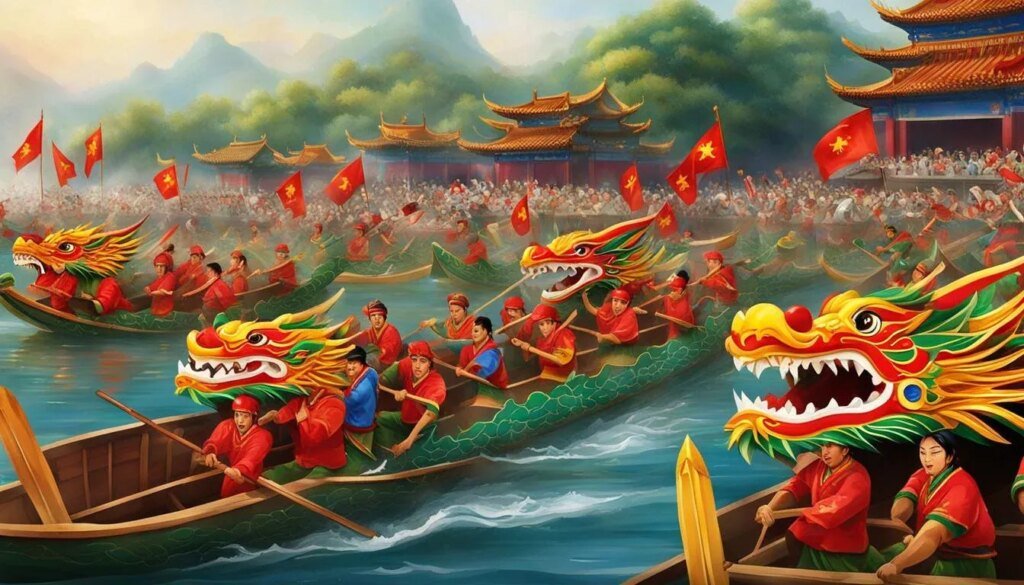
| Dragon Boat Festival Custom | Description |
|---|---|
| Dragon Boat Racing | A traditional activity where teams paddle in dragon-shaped boats to pay homage to the dragon and heroes like Qu Yuan. |
| Sticky Rice Dumplings (Zongzi) | Drinking orange-coloured wine made from realgar to drive away evils and protect against illnesses. |
| Herbal Concoctions | Bathing in baths infused with medicinal herbs to cleanse the body and promote good health. |
| Wormwood and Calamus | Hanging aromatic plants on doors and windows to repel diseases and evil spirits. |
| Realgar Wine | Drinking orange-colored wine made from realgar to drive away evils and protect against illnesses. |
| Perfume Pouches | Wearing small pouches filled with perfumes or herbal medicines to ward off evil spirits and bring good luck. |
Origins of Dragon Boat Festival
The Dragon Boat Festival has a rich history and several legends surrounding its origins. The most well-known legend tells the story of a patriotic poet named Qu Yuan, who lived during the Warring States period in ancient China. Qu Yuan was a loyal statesman and advocate for political reform, but when his proposals were rejected, he grew despondent and ultimately drowned himself in the Miluo River.
This tragic event is believed to have occurred on the fifth day of the fifth lunar month, which is when the Dragon Boat Festival is now celebrated. In an attempt to prevent the fish in the river from devouring Qu Yuan’s body, the local people threw rice dumplings wrapped in bamboo leaves into the water as a distraction. This practice eventually evolved into the tradition of eating zongzi, a special type of sticky rice dumpling, during the festival.
Another explanation for the origins of the Dragon Boat Festival dates back to ancient times when the fifth lunar month was considered an unlucky month. It was believed that evil spirits and poisonous creatures were particularly active during this time. To protect themselves from harm, people engaged in various rituals and customs, such as hanging up mugwort and calamus and drinking realgar wine. The Dragon Boat Festival gradually incorporated these customs, combining the need for protection with the commemoration of Qu Yuan’s sacrifice.
These legends and historical beliefs have shaped the cultural significance of the Dragon Boat Festival. Today, it is celebrated as a time to remember Qu Yuan, promote health and well-being, and ward off evil spirits. The festival’s customs, such as dragon boat racing and the consumption of zongzi, continue to be cherished traditions that bring communities together.
Dragon Boat Festival Names
The Dragon Boat Festival is known by various names that reflect its cultural significance and traditions. Let’s explore some of these names:
- Duanwu Jie: In Mandarin, the festival is called Duanwu Jie, which translates to the “beginning of mid-summer festival.” This name highlights the festival’s association with the arrival of summer and the celebration of the season.
- Tuen Ng: In Cantonese, the Dragon Boat Festival is known as Tuen Ng. This name is derived from the Cantonese pronunciation of the festival and is widely used in regions where Cantonese is spoken.
- Dumpling Festival: The Dragon Boat Festival is often referred to as the Dumpling Festival due to the significance of zongzi, traditional sticky rice dumplings wrapped in bamboo or reed leaves. These dumplings are a staple food during the festival and are enjoyed by families and friends.
- Double Fifth Festival: Another name for the Dragon Boat Festival is the Double Fifth Festival. This name emphasizes the festival’s occurrence on the fifth day of the fifth month in the lunar calendar, aligning with the traditional Chinese way of designating dates.
The Dragon Boat Festival is celebrated with great enthusiasm under these different names, reflecting the rich cultural diversity and regional variations across China and other Asian countries where the festival is observed.
Dragon Boat Festival Greetings
The Dragon Boat Festival is a time of celebration and reflection, and it is customary to exchange greetings with friends and loved ones. While the traditional greeting for this festival has been “Happy Dragon Boat Festival,” a more appropriate and meaningful greeting in recent times is “Safe and Healthy Dragon Boat Festival.”
The change in greetings reflects the solemn nature of the festival, which not only commemorates the past but also seeks to protect against evil forces and promote good health. By wishing others a safe and healthy Dragon Boat Festival, you acknowledge the festival’s cultural and historical significance while expressing good wishes for their well-being.
During this time, it is important to remember the values of the festival and celebrate responsibly. Enjoy the festivities, partake in the traditions, and cherish the time spent with family and friends.
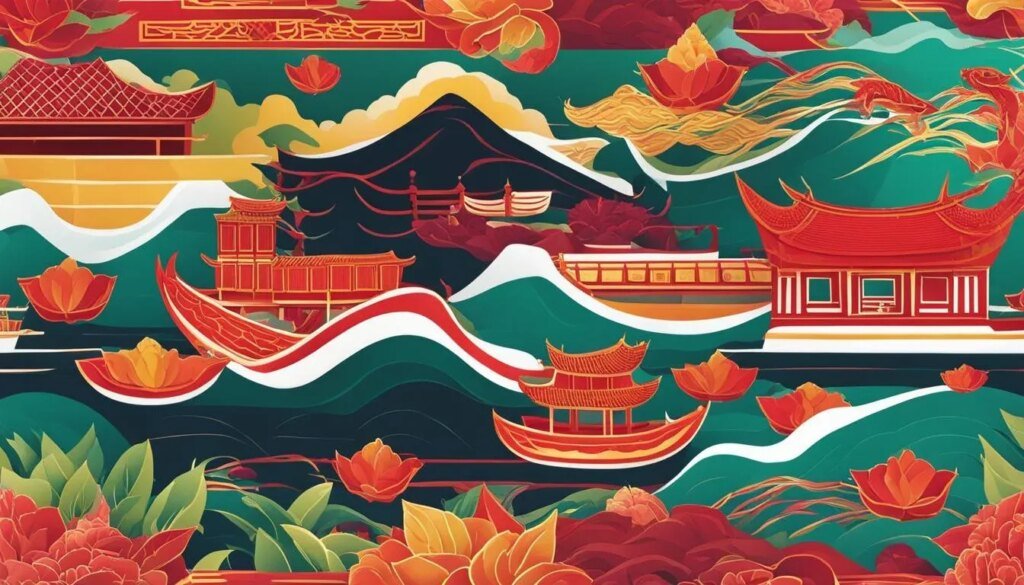
Let us continue to honour the Dragon Boat Festival with greetings that reflect its essence and purpose. May you have a joyous and fulfilling Dragon Boat Festival, filled with health, happiness, and cherished moments with loved ones.
| Traditional Greeting | Updated Greeting |
|---|---|
| Happy Dragon Boat Festival | Safe and Healthy Dragon Boat Festival |
Dragon Boat Festival Food
Zongzi, or glutinous rice dumplings, are the most traditional food of the Dragon Boat Festival. They are made by wrapping glutinous rice filled with various ingredients in bamboo or reed leaves. The flavours of zongzi vary across different regions in China.
They are believed to have originated from the tradition of throwing lumps of rice into rivers to stop fish from eating Qu Yuan’s drowned body. Today, zongzi is enjoyed by families and can also be purchased from restaurants and bakers.
Types of Zongzi
Zongzi comes in a variety of flavours and fillings, with each region having its specialty. Here are some popular types of zongzi:
- Classic zongzi: This version is filled with sticky rice, marinated pork, salted egg yolk, and other ingredients. It is commonly enjoyed by people of all ages.
- Sweet zongzi: These zongzi are filled with sweet ingredients such as red bean paste, lotus seed paste, or jujube paste.
- Savoury zongzi: Some zongzi is made with savoury fillings like minced meat, mushrooms, or chestnuts. These provide a rich and flavorful taste.
- Vegetarian zongzi: This type of zongzi is filled with vegetables, tofu, and sometimes vegetarian mock meat, catering to those who follow a vegetarian diet.
Regardless of the type, zongzi is a delicious and satisfying treat that adds to the festive spirit of the Dragon Boat Festival.
Dragon Boat Racing
The Dragon Boat Festival is synonymous with the thrilling and competitive sport of dragon boat racing. This exhilarating activity has deep historical roots and is an integral part of the festival’s celebrations. The origins of dragon boat racing trace back to an ancient legend surrounding the poet Qu Yuan.
“Legend has it that upon learning of Qu Yuan’s tragic death, villagers rushed to the river in dragon boats, beating drums and splashing water to keep evil spirits away and prevent fish from eating his body. Today, dragon boat racing is a symbolic reenactment of their efforts to find Qu Yuan and pay homage to his memory.”
Dragon boats are long and slender vessels adorned with intricate dragon-shaped heads and tails, representing the mythical creatures associated with the festival. These boats, often brightly coloured, capture the spirit of ancient traditions and showcase the craftsmanship of skilled boatmakers. A typical dragon boat is approximately 12 to 18 meters in length and can accommodate up to 20 paddlers.
Dragon Boat Racing Techniques
The success of a dragon boat race relies on teamwork, synchronization, and physical prowess. Every paddler must work in harmony, propelling the boat forward with each stroke, guided by the rhythmic drum beats that set the pace. The drummer, seated at the front of the boat, plays a vital role in maintaining the crew’s rhythm and energy throughout the race.
Competing teams demonstrate their strength and agility as they maneuver their dragon boats through the water, striving to reach the finish line before their opponents. The races are often fiercely contested, with intense rivalries between teams, adding an extra layer of excitement and adrenaline to the festivities.
Dragon Boat Festival Races
Dragon boat races are organized in various locations, showcasing the festival’s cultural significance and attracting enthusiastic spectators. The races serve as a platform for communities to come together, celebrate their heritage, and showcase their competitive spirit.
While dragon boat races are held worldwide, some cities in China are particularly renowned for their grand celebrations and thrilling races. Hong Kong’s International Dragon Boat Races, which attract teams from around the globe, are among the most prestigious and exhilarating events. Other cities such as Guangzhou and Hangzhou also host dragon boat races of great acclaim, drawing participants and spectators alike.
| City | Dragon Boat Race |
|---|---|
| Hong Kong | International Dragon Boat Races |
| Guangzhou | Dragon Boat Race Festival |
| Hangzhou | West Lake International Dragon Boat Race |
Surprising Facts About The Dragon Boat Festival
- 🚣♂️ Origins in Qu Yuan’s Memory: The Dragon Boat Festival, also known as Duanwu Festival, originates from the commemoration of the ancient Chinese poet Qu Yuan, who drowned himself in the Miluo River as a form of protest against corruption.
- 🍚 Zongzi Delicacy: One of the festival’s traditional foods, zongzi, is a pyramid-shaped dumpling made of glutinous rice wrapped in bamboo leaves. These savoury or sweet treats are often filled with ingredients like pork, beans, or nuts.
- 🏮 Racing Roots: Dragon boat racing, a popular festival activity, has a history dating back over 2,000 years. It was initially organized as a way to search for Qu Yuan’s body and to keep fish and evil spirits away from his remains.
- 🌾 Wormwood and Calamus Rituals: Some regions include the hanging of wormwood and calamus on doors during the festival. These aromatic herbs are believed to ward off evil spirits and diseases, reflecting the festival’s roots in warding off plagues.
- 🚤 International Dragon Boat Federation: The International Dragon Boat Federation (IDBF) was formed in 1991 and has since facilitated the global growth of dragon boat racing. It organizes events and promotes the sport internationally.
- 🎐 Five Poisonous Creatures Symbolism: In some areas, the festival is associated with the belief in the influence of five poisonous creatures: snakes, centipedes, scorpions, lizards, and toads. People take measures to protect themselves from these creatures during the festival.
- 🏞️ Environmental Impact: In recent years, there has been a growing awareness of the environmental impact of traditional festival practices. Efforts are being made to reduce waste from zongzi wrappings and to promote eco-friendly celebrations.
- 🌑 Double Fifth Day: The Dragon Boat Festival falls on the fifth day of the fifth month of the Chinese lunar calendar. It is also known as the Double Fifth Day, emphasizing the significance of the number five in Chinese culture.
- 🌱 Realgar Wine Tradition: In some regions, people drink a type of wine called xionghuangjiu, made with realgar, during the festival. It is believed to have medicinal properties and is thought to help ward off evil spirits and prevent diseases.
- 🎈 Modern Festive Innovations: While maintaining traditional elements, the festival has embraced modernity. Some dragon boat races now feature colourful LED lights, music, and lively celebrations, attracting a diverse audience beyond the cultural and historical context.
Other Dragon Boat Festival Customs
Aside from participating in dragon boat racing and enjoying delicious zongzi, the Dragon Boat Festival also encompasses a variety of customs that add to its festive ambience. These customs have been passed down through generations and continue to be practised today. Let’s explore some of these fascinating traditions:
Hanging Mugwort and Calamus
One of the customs during the Dragon Boat Festival is the hanging of mugwort and calamus on doors. This practice is believed to have originated from the belief that mugwort and calamus possess powerful properties to repel diseases and ward off evil spirits.
By hanging these herbs on their doors, people hope to create a protective barrier and ensure the well-being of their households.
Drinking Realgar Wine
Another significant tradition is the consumption of realgar wine. Realgar, a type of mineral, is believed to have the ability to drive away diseases and evils. During the Dragon Boat Festival, people prepare and drink realgar wine as a way to cleanse themselves and their surroundings from negative energies, ensuring a healthy and prosperous future.
Wearing Perfume Pouches
One delightful tradition that children eagerly participate in is the wearing of perfume pouches. Perfume pouches, also known as sachets, are small bags filled with perfumes or herbal medicines. These pouches are traditionally made with colourful silk cloth and adorned with intricate embroidery. Children wear them around their necks or attach them to their clothes as a protective talisman against evil spirits.
These customs contribute to the vibrant and lively atmosphere of the Dragon Boat Festival, adding depth and meaning to the celebration.
Whether it’s hanging mugwort and calamus, drinking realgar wine, or wearing perfume pouches, each tradition carries its significance and helps create a memorable experience for everyone involved.
| Dragon Boat Festival Customs | Description |
|---|---|
| Hanging Mugwort and Calamus | This custom involves hanging mugwort and calamus on doors to repel diseases and ward off evil spirits. |
| Drinking Realgar Wine | People consume realgar wine during the festival to drive away diseases and evils. |
| Wearing Perfume Pouches | Children wear perfume pouches filled with perfumes or herbal medicines as a protective talisman. |
Conclusion
The Dragon Boat Festival in China is an enchanting celebration of Chinese traditions and cultural heritage. This vibrant holiday, which honours historical figures like Qu Yuan and promotes good health, captivates people from all walks of life. The festival’s customs, food, and activities come together to create a festive atmosphere that brings families and communities closer.
One of the highlight activities of the Dragon Boat Festival is the thrilling dragon boat races. These races symbolize unity, teamwork, and the spirit of competition. Crowds gather along the riverbanks, cheering on the paddlers as they navigate the waters with great strength and determination.
Food plays a central role in the Dragon Boat Festival. Delicious zongzi, sticky rice dumplings filled with various ingredients, are enjoyed by people of all ages. The process of preparing and sharing zongzi becomes a family affair, strengthening the bonds between loved ones. The unique flavours and aromas of zongzi add to the festive ambience of the holiday.
Participating in the Dragon Boat Festival offers an immersive experience of Chinese culture and traditions. From the lively dragon boat races to the mouthwatering zongzi, this holiday is a beautiful expression of China’s rich history and collective spirit. So, embrace the excitement, indulge in the flavors, and immerse yourself in the Dragon Boat Festival in China!

